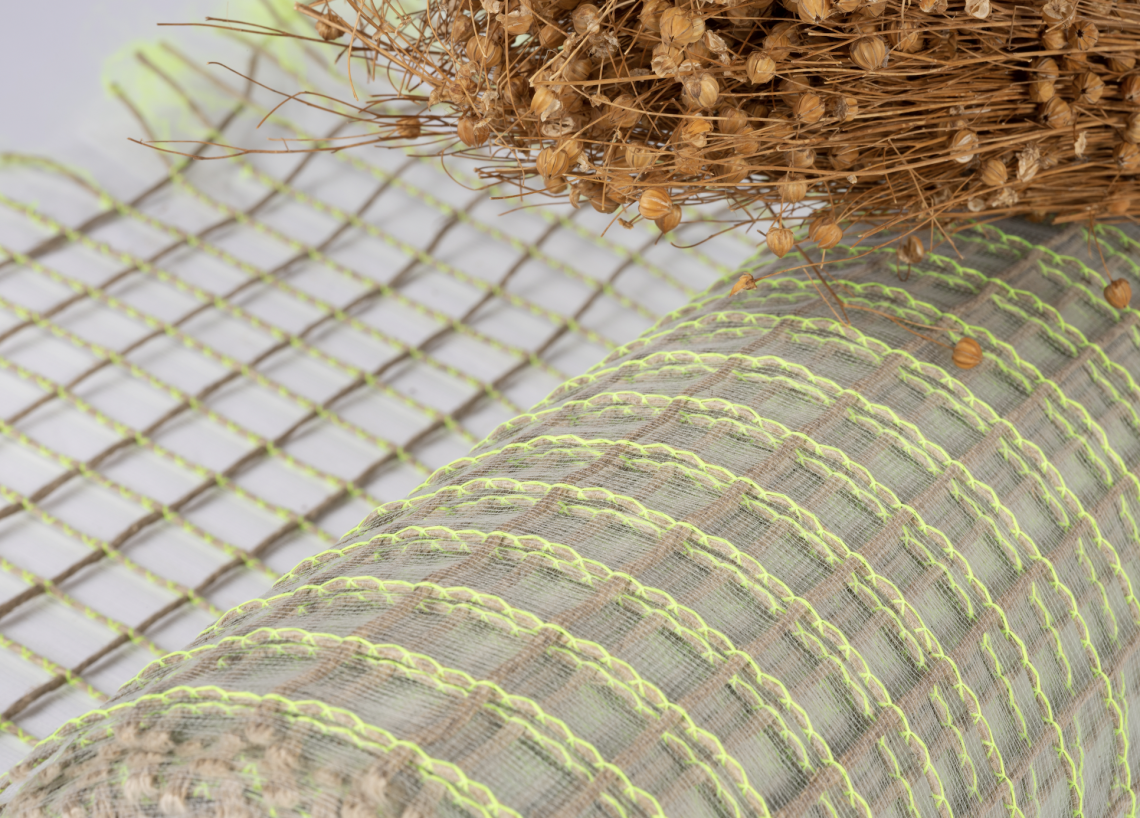The makers of cars, airplanes and yachts have always been on the lookout for lighter weight materials that will help reduce fuel and energy consumption. Now they are additionally searching for products that will help them go greener faster.
Swiss scale-up Bcomp checks both boxes. The company’s high-performance components, which are made from natural flax fibers, enable substantial weight and Co2 emission reductions versus standard materials, with applications ranging from Formula 1 and automotive to aerospace and luxury sailing yachts.
Industry sees the potential. The company raised a $35 million round in April from automotive venture capital funds BMW i Ventures, Volvo Cars Tech Fund and Porsche Ventures – alongside Airbus Ventures, Generali, and existing investors.
The investments as well as ongoing projects with Bcomp are an example of how global mobility companies are joining forces with start-ups to work on pioneering materials that can help them reach their sustainability goals.
Within the auto industry, a move toward a net-zero economy and a new future for mobility is well underway: manufacturers are accelerating the development of electric, connected, autonomous, and shared mobility. The industry has attracted more than $400 billion in investment over the past decade—and around $100 billion since the beginning of 2020, notes a recent McKinsey report. Part of the effort focuses on how to reduce life cycle emissions associated with materials and how to decarbonize the manufacturing process.
Bcomp’s products promise to replace carbon fibers, glass fibers and petrochemical-based plastic parts, a small but important part of the journey to greener mobility. The transition is not without challenges. Certifying new materials, ramping up mass production and integrating them into the supply chain is an arduous task. The support of corporate mobility venture funds, motorsport’s openness to trying new products and potential distribution deals with third parties are helping Bcomp tackle some of the hurdles.
But before its solutions can scale and have a meaningful impact the Swiss scale-up needs to work with industry to find the right formula for pricing sustainable materials. “Automotive top management has set aggressive Co2 targets, and we are helping them meet those targets by replacing parts with our materials but purchasing departments say they don’t want to pay a premium for that,” says Bcomp CEO Christian Fischer. “The circular economy has a cost. Companies need to put a value on it and come up with a number: for each ton of Co2 we reduce they are prepared to pay X euros.’
Using Flax Fibers As A Building Block
Bcomp was founded by Fischer and Julien Rion, material science PhDs from the Swiss Federal Institute of Technology Lausanne (EPFL). They began working out of a garage in 2011 with a mission to create lightweight yet high performance skis, using flax fibers to reinforce the balsa cores and improve shear stiffness. The skis, called bCores, were adopted by some of the biggest names in freeride skiing and in 2017 the FT named Bcomp one of the fastest growing companies in Europe.
However, “skiing is a niche market so it was quite clear that if we wanted to really have an impact, we would need to use flax fibers as an elementary building block to develop new materials with clear benefits for the mobility markets,” says Fischer.
The founders decided to start with motorsports, which has a history of experimenting with new materials. Reinforcement technology developed by Bcomp called powerRibs (pictured here) aims to maximize stiffness with minimal weight by creating a 3D structure on one side of a thin-walled shell element. This enables a decrease in the amount of base material used, reducing weight, costs and consumables in production. The base is fortified by a visible layer of flax fibers called ampliTex which serves as a carbon-neutral replacement for conventional covering material. Combining the two materials makes it possible, for example, to cut the amount of plastic used for interior paneling in cars by up to 70% while simultaneously reducing CO2 emissions by as much as 60%, according to Bcomp. The material also reduces weight by about 50%.
Volvo Cars started testing Bcomp’s materials in 2018 in its Volvo Ocean Race Recycled Plastics Demonstrator Vehicle. Its most recent concept car, the Volvo Cars Concept Recharge in 2021, the Swedish car company is using Bcomp’s natural fiber composites for the lower storage areas, back of the headrest and the footrest inside the car and in the front and rear bumpers as well as the sill mouldings in the exterior.
BMW has been using Bcomp’s ampliTex and powerRibs technologies in motor racing categories since 2019. Starting with a Formula E race car, the technologies have also been used for parts of the 2020 BMW M4 DTM bodywork and include the recently announced BMW M4 GT customer racing exterior and interior.
Porsche worked alongside the Bcomp team to develop the first natural fiber composite motorsport door in 2019, with the project being listed as a finalist in the JEC Innovation Awards. Following that success, Porsche Motorsports used ampliTex and powerRibs in the production of both exterior and interior vehicle components for the Cayman 718 GT4 CS MR, culminating in the launch of Porsche’s fully electric Mission R concept car in 2021. Many of the Mission R’s add-on parts are made using Bcomp’s natural fiber reinforced plastic. The natural fiber material can be seen on the car’s exterior, such as the front splitter, the doors, the side skirts and the diffuser.
Bcomp is also now supplying its high-performance natural fibre technologies to HWA AG – development partner of Mercedes-AMG – for the new front bumpers on Mercedes-AMG GT4 race cars. Set to be phased in over the coming weeks, Bcomp’s bodywork solutions will provide a sustainable alternative to the GT4’s existing carbon fiber panels, offering equivalent mechanical performance in stiffness and weight. The material also offers another plus: it doesn’t shatter in the same way as carbon fiber in event of a crash, thus reducing the risk of puncture-related accidents.
A full sustainability analysis concluded that the new bumper offered a total material emission reduction of 90% when compared to the carbon fiber part as well as an 85% reduction of CO2 emissions from cradle-to-gate, considering all production steps from raw material to final part., according to Bcomp. Bcomp says its materials reduce the part’s carbon cost, but they also introduce the option of thermal energy recovery. Since the new bumper is full natural fiber, it can be used for thermal energy recovery, turning approximately 80% of the energy stored in the part into renewable energy, resulting in a process without hazardous carbon waste or parts that need to go into landfill.
Scaling Up
To make a real impact the car companies will need to use natural fiber composites in the hundreds of millions of cars they sell to consumers.
Volvo Cars’ affiliate Polestar aims to adopt Bcomp materials for most of the interior panels of the Polestar 5, the production evolution of the Polestar Precept, which is expected to be launched in 2024.
Meanwhile, BMW Group Research and Bcomp are also setting up a development collaboration with the aim of using a higher proportion of renewable raw materials for components in future vehicle models.
“Bcomp is a good case,” says Marcus Behrendt, Managing Director, BMW i Ventures. “They are pretty far down the road in terms of acceptance of the tech and its advantages and sustainability and they have a good reputation in the industry.”
BmW i Venture introduced Bcomp to BMW’s Startup Garage, which facilitates proof-of-concept trials with smaller companies, gives them training on how to successfully work with large companies and helps them to get their products certified so they can apply for a supplier number and be accepted into BMW’s procurement system.
The car maker’s venture arm has also fostered introductions to people in various divisions of BMW. “The more people know about you the more you have chance of being successful,” says Behrendt.
But funding and successful proof of concept trials are just a start. To make the transition to the serial production of consumer cars Bcomp needs to move from serial production in a sports and motor setting to scaling its production of automotive grade products to be installed in anywhere from 2,000 to 10,000 vehicles a day in locations around the globe.
It’s a big leap. Behrendt says he believes Bcomp can successfully sell its materials to Tier 1 suppliers, companies that supply parts or systems directly to the big car companies.
When Bcomp first started talking to car companies the promise of savings of up to 50% weight reduction triggered their interest, but “this was immediately followed by questions such as ‘Can you produce 100,000 square meters per year? What does your supply chain look like? How do you control quality? If we have a problem, who do we call’,” recalls Fischer. “Getting a new product into the automotive manufacturing process takes about five years but we have spent the last few years validating what we claim in motorsport, and the car companies see there is potential for us to deliver on our promises.”
The Sky Is Not The Limit
Bcomp is already well-advanced in its effort to target the aviation sector through a long-term partnership with a company in the airplane maintenance and overhaul space. Once it proved the weight saving potential of its material, the partner – which Bcomp said it could not name- said it would fund further development so the material would adhere to aviation safety requirements. “We now have a solution that passes the fire retardancy test and are in process to scale that technology and roll out prototypes parts used in airplanes by the end of the year and from there be ready to roll this out to passenger aircraft by 2024,” says Fischer. “That will unlock our material’s use in mass transportation, including buses all the way to large ships,” he says.
Fischer says Bcomp’s progress to date is “ the tip of the iceberg. We want to create a new supply chain and cascade that through to other supply chains. Our mission is to make mobility more sustainable. We increase our positive impact the more we scale, so it is in the industry’s interest to help us do that.”
This article is content that would normally only be available to subscribers. Sign up for a four-week free trial to see what you have been missing.
For more of The Innovator’s Profits With A Purpose articles click here.







